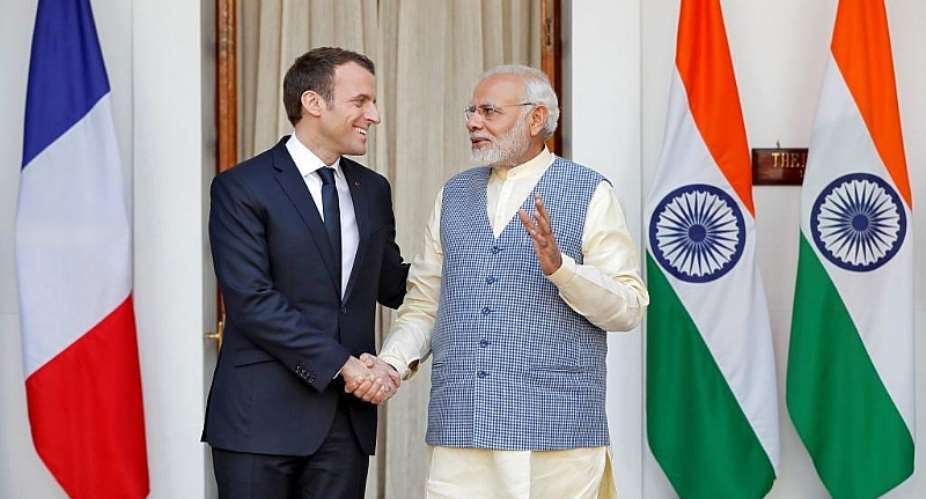Indian Prime Minister Narendra Modi has met with President Emmanuel Macron in Paris before attending the weekend G7 summit, where he will face world leaders for the first time since making changes to the status of Kashmir that have raised tensions with Pakistan.
Macron invited the Hindu nationalist premier for an official visit to Paris to discuss the two countries' extensive cooperation in areas of defence, nuclear energy, maritime affairs and counterterrorism.
The French president has also invited India to attend the weekend's G7 summit in Biarritz, along with leaders of Australia, Chile and South Africa, as four “major partners committed to the protection and promotion of democratic freedoms”.
India's Ministry of External Affairs said Modi would speak to G7 leaders about the environment, climate, oceans and digital economy.
France in tune with India's interests
It was not clear to what extent either meeting would address Modi's decision of 5 August to revoke the semi-autonomous status of the Indian-controlled part of the northern region of Kashmir, which is also claimed by rival neighbour Pakistan.
But Macron and Modi have already met several times in the continuation of one of India's strongest partnerships with a Western power.
“Even in these recent tensions with Pakistan, France has been seen widely in India as playing a positive role in understanding the Indian national interest and viewpoint,” says Sreeram Sundar Chaulia, professor and dean at the Jindal School of International Affairs near New Delhi.
“Unlike Britain and some other European countries, France especially seems to be more in tune with Indian interests and considerations. And this is not new, it goes back several decades.”
Hopes for Macron to speak on Kashmir
France's reluctance to speak about the situation in Kashmir has not gone completely unnoticed.
“I suspect France will be focussed on bilateral business deals, but I would hope Kashmir would not be entirely absent from the conversations,” says Mira Kamdar, a Paris-based author and commentator on modern India.
“I would hope […] that France might take an official position with regard to Kashmir and ask for the current complete communications shutdown to be ended and lifted and for the former elected leaders of Kashmir who have been placed under house arrest to be released.”
Olivier Guillard, associate research fellow at the French Institute for International and Strategic Affairs, says such issues are important for Macron but expects diplomats will have laid the groundwork for a nuanced approach to the issue.
“Modi knows that in France, human rights and democracy are important, but he will probably have sent in advance messages to Paris that Kashmir is an internal and domestic issue that does not need to be discussed in a large meeting with other foreign leaders,” he says.
“It will probably be an issue a discussed more in the media than by the two leaders.”
Modi facing world leaders
Likewise, Guillard does not expect G7 leaders to push hard on the Kashmir issue.
“Because India is now such an important and successful partner for investment, the market, the obvious political stability in this country for decades, Mr. Modi should have to spend too much time defending the decision,” he says.
Still, the issue has global security implications, given the tensions it raises between India and its rival neighbour Pakistan, both nuclear-armed powers.
Before heading to the annual United Nations General Assembly in New York in September, Modi may see the G7 as an opportunity to lay out India's position to a smaller gathering of world leaders.
“Modi will be trying to mobilise international opinion to understand what India has done and to restrain Pakistan from fomenting violent extremism and jihadism in Indian Kashmir,” says Sreeram Sundar Chaulia.
“The Indian view is that what we're doing in Kashmir is not the problem, the problem is what is coming from across the border, from the Pakistani side, and that needs to be checked and controlled. I think that will be Modi's key message.”





 Saglemi Housing Project will not be left to rot – Kojo Oppong Nkrumah
Saglemi Housing Project will not be left to rot – Kojo Oppong Nkrumah
 Transport fares hike: GPRTU issue two-day ultimatum
Transport fares hike: GPRTU issue two-day ultimatum
 ARC endorses Alan as presidential candidate – Buaben Asamoa
ARC endorses Alan as presidential candidate – Buaben Asamoa
 Akufo-Addo appoints Kwasi Agyei as new Controller and Accountant-General
Akufo-Addo appoints Kwasi Agyei as new Controller and Accountant-General
 PNC dismiss reports of mass resignations
PNC dismiss reports of mass resignations
 PAC advocates for revenue collectors to be engaged on commission basis, not full...
PAC advocates for revenue collectors to be engaged on commission basis, not full...
 Genser Energy commissions 110km of natural gas pipeline at Anwomaso
Genser Energy commissions 110km of natural gas pipeline at Anwomaso
 Naa Torshie calls for tolerance, peace ahead of 2024 election
Naa Torshie calls for tolerance, peace ahead of 2024 election
 Asantehene commends Matthew Opoku Prempeh for conceiving GENSER Kumasi Pipeline ...
Asantehene commends Matthew Opoku Prempeh for conceiving GENSER Kumasi Pipeline ...
 Let’s do away with ‘slash and burn politics’ in Ghana — Dr Adutwum
Let’s do away with ‘slash and burn politics’ in Ghana — Dr Adutwum
